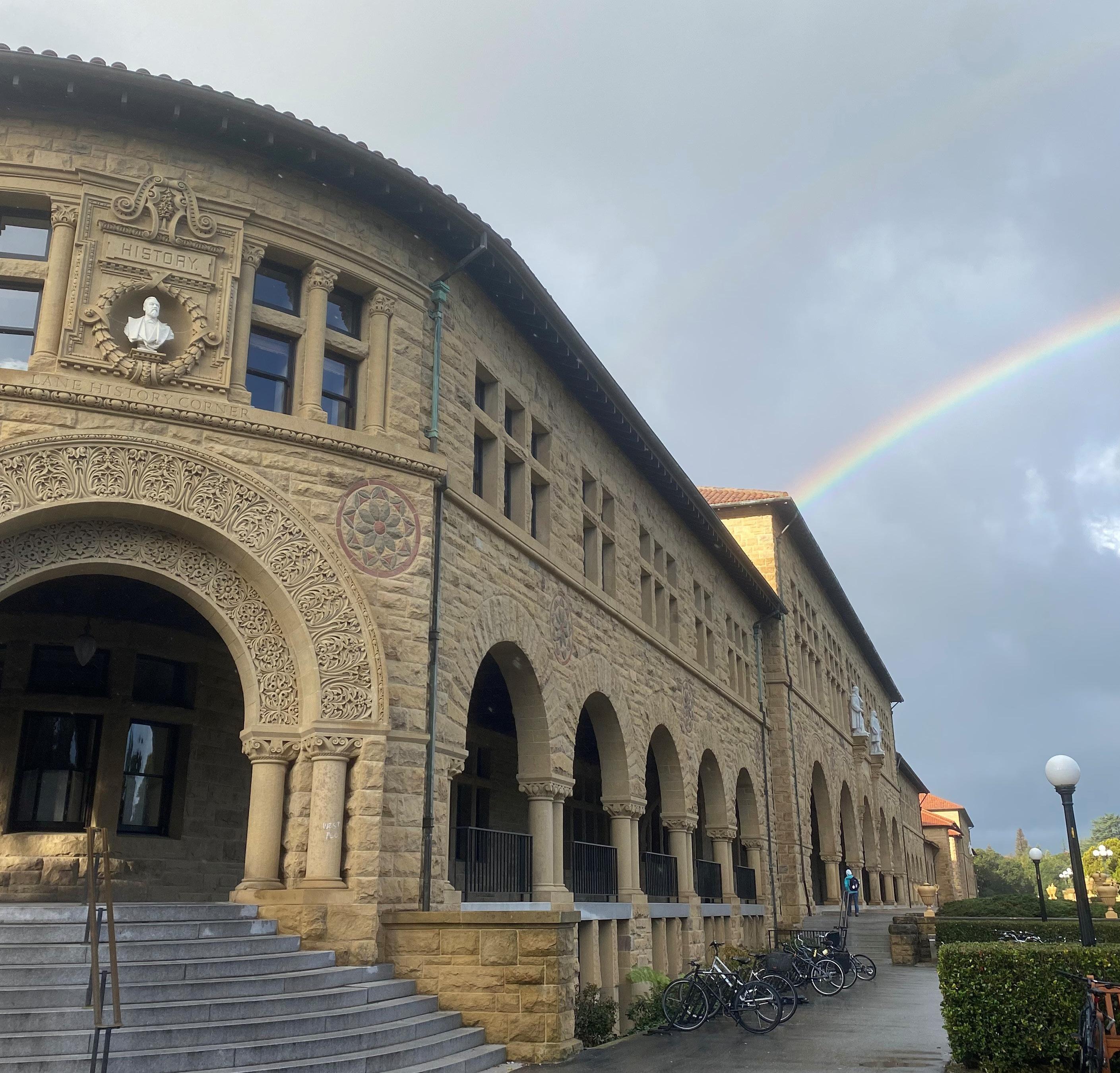Stanford Historian 2025



Dear Faculty, Current Students, Alumni and Friends,
Happy summer from Lane History Corner! I hope this 2025 issue of the Stanford Historian serves as a welcome update to our activities during the past academic year.
In the following pages, you’ll find more background, stories, and information about our faculty and students’ achievements. Our department calendar from September 2024 through June 2025 was filled with over 300 events. Exciting research projects, well-deserved fellowships and awards, and new partnerships have filled our calendars. The faculty published numerous single- and co-authored books, many of which garnered prizes and received international recognition. Over 150 courses kept our students engaged in their academic pursuits, and just last month we conferred 32 BA, 4 MA, and 11 PhD degrees. We also published the 35th edition of our undergraduateedited journal, Herodotus, highlighting the robust historical writing of our students.
We welcomed to History Corner seven long-term visitors who taught and conducted research on the history of Europe, Latin America, and the United States: Valentina Serio (Marie Curie Fellow, Ca’Foscari University of Venice), Ernesto Domínguez López (Tinker Visiting Professor, University of Havana), Mario Cams (Kratter Visiting Professor, KU Leuven), Edward Loss (Kratter Visiting Professor, University of Genoa), Thomas Olechowski (Distinguished Visiting Austrian Chair, University of Vienna), Ewa Domańska (Visiting Professor, Adam Mickiewicz University), and Susan Stryker (Clayman Institute Distinguished Visitor, University of Arizona). Looking ahead to the 2025-26 academic year, we are thrilled to welcome Jana Hunter as Assistant Professor of Modern Eastern European History. In residence we will have Professor Cornelius Torp (University of Bremen) as Kratter Visiting Professor in Modern Europe.
This year, U.S. universities and their international counterparts have faced many challenges. As we work to meet these challenges, we are grateful for your continued support so as to sustain and surpass our current excellence in teaching and research. If you’d like to support our activities, please review our giving opportunities, follow us on X/Twitter, visit our website, answer our Alumni Questionnaire, and feel free to reach out to us at history-info@stanford.edu. Thank you for supporting the Stanford Department of History.
Sincerely,
Caroline Winterer Chair, Department of History
William Robertson Coe Professor of History and American Studies
Stanford University
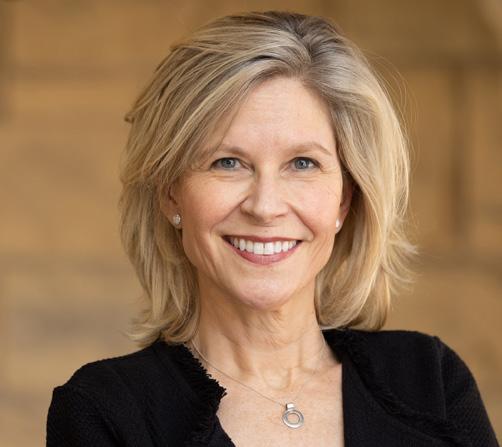
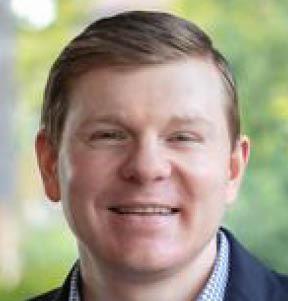
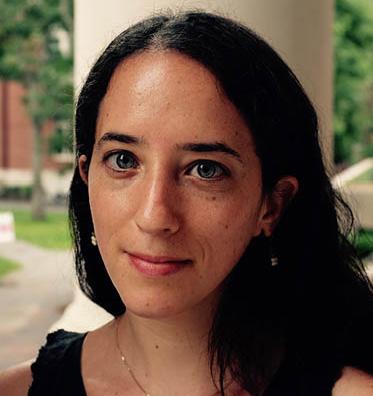





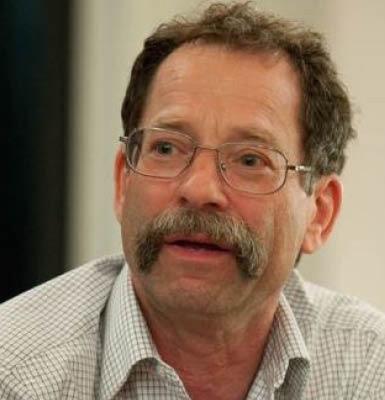
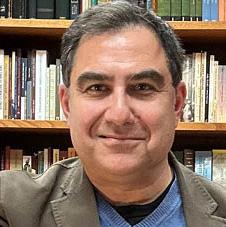
How can we understand the events, ideas, and conflicts that have featured in the news cycle during the past year? The History of 2024 offered the historically informed reflections on last year’s momentous events, providing an opportunity to understand our world in its historic context. Each week featured a different History faculty member speaking on a major news topic of the year, showing what we can learn by approaching it from a historical perspective.
More than 130 students attended the course to reflect on the challenges and opportunities of 2024 through a historically-rounded analysis and methods. We look forward to the next iteration of the course in Autumn 2025.
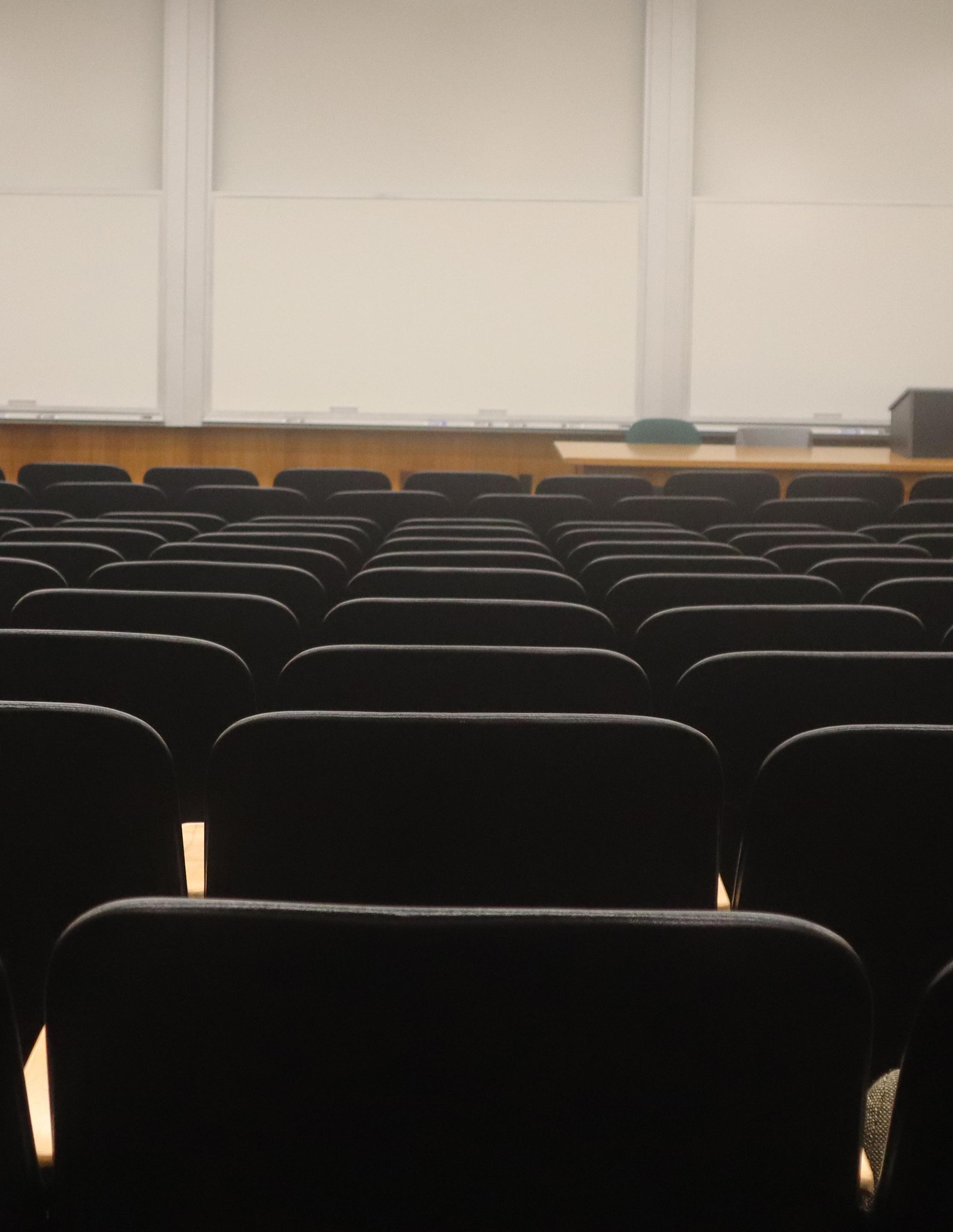
Jonathan Gienapp
Why Does the U.S. Have the Electoral College?
Gili Kliger The Past and Future of Reparations
Amir Weiner
Israel 2024: Domestic and External Challenges
James Campbell The Struggle for Voting Rights
David Como Electoral Politics: A Deep History
Mikael Wolfe
The Origins of the Climate Crisis and What’s at Stake in the 2024 Presidential Election
Jennifer Burns
The Evolution of American Conservitism
Joel Beinin
Understanding October 7, 2023 and Israel’s War on the Gaza Strip
Ali Yaycioglu
A Global Election Year - The Dawn of a New Global Landscape
2024-2025 was another year teeming with an abundance of events, programs, workshops and reading groups for the Department of History!
Once again, for the ten months spanning September 2024 through June 2025, we hosted over 300 academic events, averaging more than one event per day, seven days a week, for 273 straight days. Through these events, we welcomed visitors from around the world and cooperated with multiple campus partners to assemble a phenomenal list of presentations and forums for Stanford faculty, students, affiliates, and the community.
The Africa Research Workshop, Digital History Series, East Asian History Reading Group, Eurasian Empires Workshop, European History Workshop, Gender History Workshop, Mexican and Mexican American Studies Reading Group, Slavery and Freedom Workshop, Stanford Environmental and Climate History Workshop, and U.S. History Workshop returned in force this year with a stellar lineup of speakers and talks. The British History Lecture Series hosted the 50th Annual PCCBS Conference (more on Page 11!), and we gladly welcomed four new series: the Early Modern History Workshop, the Latin American and Caribbean History Workshop, the Theodor Adorno Reading Group, and the History & Philosophy of Science Reading Group, organized by the Program in History & Philosophy of Science. The Ottoman Empire and Middle East Workshop returned after a brief hiatus, and we continued our collaborative relationship with The Bill Lane Center for the American West, organized by Professor Emeritus David Kennedy and Professor Kathryn Olivarius, to welcome a number of seminars. More information about our Events can be found here.
Last year we also welcomed back a number of alumni to History Corner. In the Fall, Syracuse University Professor Junko Takeda (PhD, ’06) gave a talk titled Undocumented: Writing a Korean-Japanese American Memoir. In the Spring, University of Massachusetts, Amherst Professor Liz Jacob (PhD, ’22) served as the keynote speaker for the Decolonozing Gender & Sexuality 2025 conference, hosted by the Program in Feminist, Gender, and Sexuality Studies, and gave a talk titled Rethinking Maternalism: Sex, Power, and Embodiment in Côte d’Ivoire. UC Irvine Professor David Fedman (PhD, ’15) gave a lecture as part of the Stanford Environmental and Climate History Workshop titled Shadows in the Forest: The Ōji Paper Company and Japan’s Pulp Pipeline in Asia, and historian Scott Spillman (PhD, ’17) presented on his new book, Making Sense of Slavery: America’s Long Reckoning, from the Founding Era to Today. It was truly wonderful to welcome back these alumni and watch them interact with former advisors, as well as witness the lasting impact this Department provides. We look forward to welcoming University of Virginia Professor Joseph Seeley (PhD, ’19) this coming Fall 2025 for a book talk on his first book, Border of Water and Ice: The Yalu River and Japan’s Empire in Korea and Manchuria.
As the summer begins to wind down, I’m excited to announce that we have the beginning of what is sure to be a full docket already on the calendar. I hope you’ll be able to join us and I look forward to seeing you around Building 200 soon!
Have an enjoyable August, and please join us once events pick back up again in September!
Colin Hamill Events & Communications Coordinator
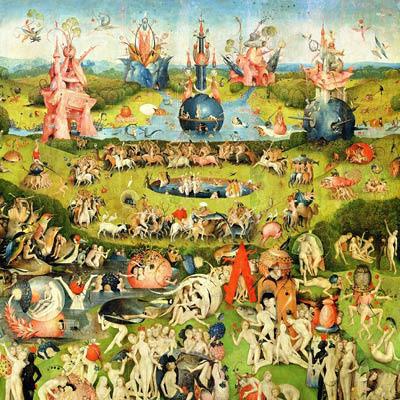

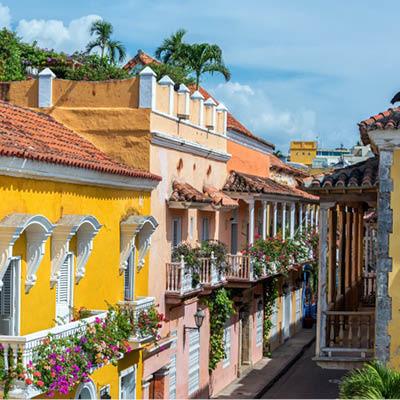

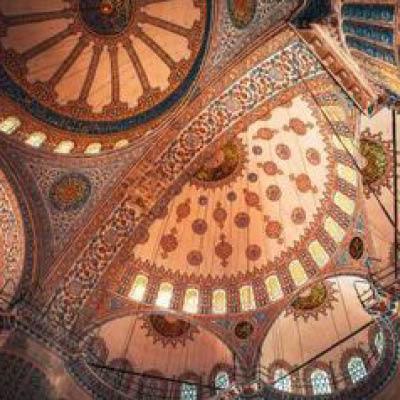
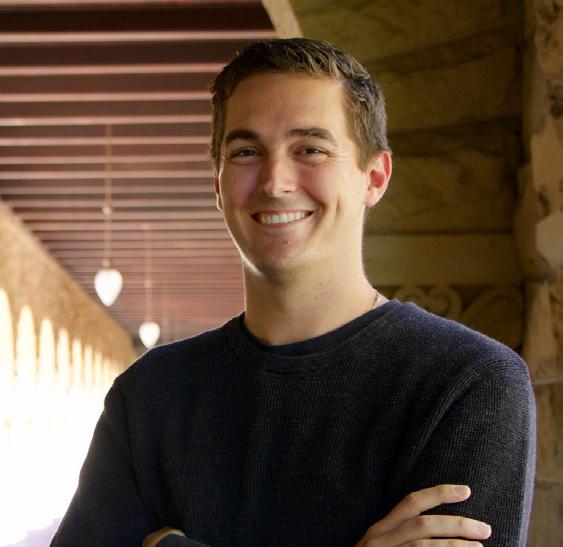
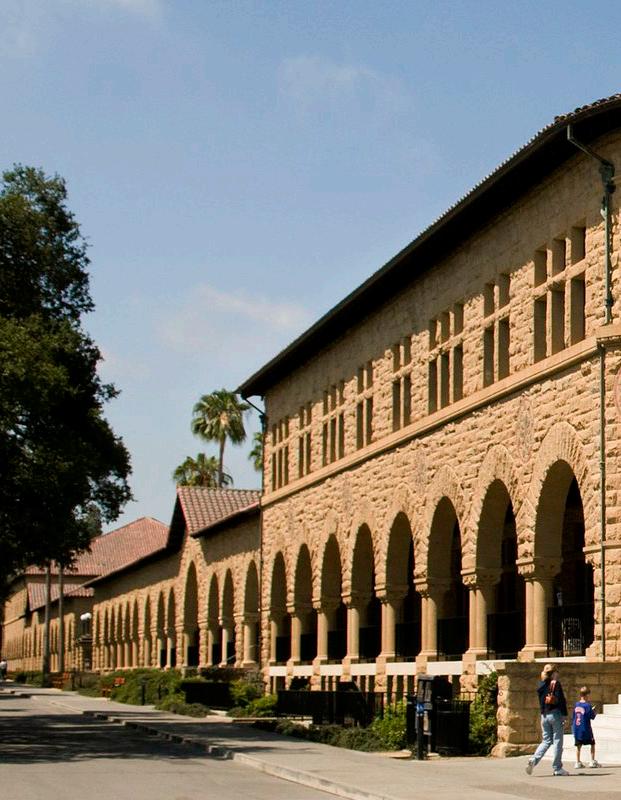
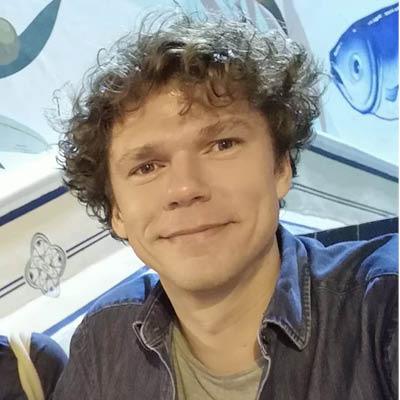

Mario Cams (KU Leuven) | Kratter Visiting Professor
During Professor Cams’ visit in Fall 2024, he participated in two talks co-sponsored by the Department of History and the Center for East Asian Studies:
• Stone, Paper, Silk: Yang Ziqi and the Topological Mapping of the Ming State
• Circling the Square: How Geometrical and Administrative Mapping Intersected in Seventeenth-Century Eurasia
Gabriel Garnero (Blas Pascal University) | Fulbright Scholar
Dr. Garnero gave a talk, co-sponsored by the Department of History’s Latin American and Caribbean History Workshop and the Center for Spatial and Textual Analysis, titled Nature’s Contributions to Argentina and Their Social-Ecological Legacies: Leveraging Digital Analytical Tools

Edward Loss (University of Genoa) | Kratter Visiting Professor

During his Stanford residency, Professor Loss taught History 301AR: From the Court to the Archive: Criminal Justice and Documentary Culture in Premodern Italy, gave a talk titled Jewish Women and Notarial Deeds in Renaissance Bologna, as part of the Center for Medieval and Early Modern Studies (CMEMS)’s weekly workshop series, and participated in a Cite and Sound conversation with Professor Rowan Dorin through the Taube Center for Jewish Studies.
Ernesto Domínguez López (University of Havana) | Tinker Visiting Professor
Professor Domínguez López joined the Department for Winter & Spring 2025, sharing his expertise in the classrooms of History 178: Film and History of Latin American Revolutions and Counterrevolutions and History 376: Populism in the Americas, as well as speaking at two events: US-Cuban Relations: Before and After a Watershed Election, organized with the Center for Latin American Studies, and Knowledge Capitalism, Hegemonic Transition and Elections in Latin America for the Department of History’s Latin American and Caribbean History Workshop.
Ewa Domanska
Visiting Professor | Adam Mickiewicz University

Lecturers
Madihah Akhter
Jelena Batinic
Ali Carkoglu
Charlotte Hull
Quinn Javers
Gili Kliger
Marissa Mika
Jenna Phillips
Katie Gaddini
Visiting Scholar | University College London
Lucie Messy Visiting Scholar | Paris at La Sorbonne
Thomas Olechowski
Distinguished Visiting Austrian Chair | University of Vienna
Valentina Serio
Marie Curie Fellow | Ca’ Foscari University of Venice
Susan Stryker
Clayman Institute Distinguished Visitor, University of Arizona
Fellows
Eduardo Acosta Mellon Fellow
Samia Errazzouki Mellon Fellow
Theresa Iker Choi-Lam H&S Lecturer in Undergraduate Teaching
Yuhe Faye Wang IDEAL Provostial Fellow
Professor Jana Hunter will join the History Department in September 2025. Professor Hunter received her M.Phil. from the University of Cambridge and her D.Phil from the University of Oxford in 2024. Her doctoral dissertation, titled “Living Modernity through Time: Bohemia from Revolution to Republic, c. 1848-1918,” explores the modernization of Bohemia during the long nineteenth century through the lens of multiple, competing temporalities. Her research appeared in edited volumes and academic journals. She has taught extensively at the University of Oxford.
How did you become interested in Modern European History?
Growing up, I spent a lot of time in the Czech Republic and across East Central Europe surrounded by stories about life under communism and the Cold War. Those stories were personal, often funny, sometimes unsettling, and they made me curious about how my family and others lived through political and ideological upheaval. It wasn’t until university, however, that I began thinking more critically about how the region has been imagined, marginalized, or mythologized. I was initially drawn to Cold War history, but courses on the Romantic Revolution and the Habsburg Empire shifted my focus. I began to see the nineteenth century not just as a prelude to war or dictatorship, but as a moment of competing temporalities, ideologies, and everyday negotiations. A course called ‘Mapping Eastern Europe’, where we read travel writers from John Paget to Rebecca West, pushed me to think more about representation and narrative. Reading Larry Wolff’s Inventing Eastern Europe alongside it helped me realise that the region had long served as a mirror for outsiders’ anxieties and desires. During my undergraduate studies in Montreal, I became interested in East Central European émigré communities in North America. In the archives, I began thinking about how migrants navigated between bureaucratic categories and lived experience - how they made sense of home, time, and political belonging across shifting borders and ideologies. I brought those questions back to East Central Europe, this time asking them inwardly: how was time experienced within the region itself? How did people in Bohemia and beyond understand the rhythms of political life, industrial change, and cultural transformation? Ideas of time kept resurfacing - in migration, in environmental memory, in cultural expression. I traced the time of mobility and displacement, of imagined pasts and uncertain futures, of progress and perceived backwardness. During my M.Phil and D.Phil, that interest developed, and it continues to shape the questions I ask about how people in East Central Europe lived, narrated, and contested modernity. That, ultimately, is what drew me to Modern European History.
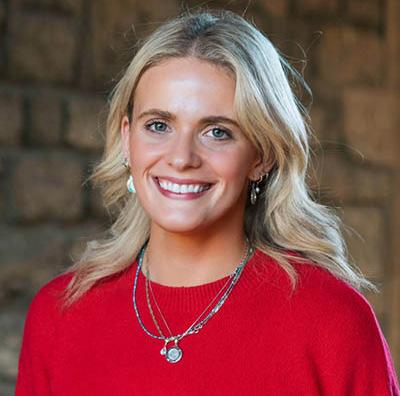
Tell us about your dissertation project and your plans for publication.
In Living Modernity through Time in Bohemia: From Revolution to Republic c.1848-1918, I explore how communities in Bohemia experienced modernity through shifting relationships to time. Focusing on the period from the 1848 revolutions to the creation of Czechoslovakia in 1918, I argue that temporality - i.e., how time was measured, felt, organised, and contested - shaped everyday life, political claims, and cultural identities in this multilingual, multi-confessional region of the Habsburg Empire. I take a case-study approach, moving across rural, industrial, urban, and religious spaces to examine how individuals and communities navigated the accelerating pressures of modernisation: from industrialisation and imperial standardisation to nationalism and new scientific conceptions of deep time. Each chapter is built around a space - village, mine, spa, city, or pilgrimage routeand reveals how older temporal frameworks (rooted in religion, nature, or local tradition) interacted with, adapted to, or resisted modern time regimes imposed by clocks, calendars, industrialisation, economic markets, and infrastructure. Rather than seeing modernity as a totalising or disruptive force, I show that Bohemian communities actively negotiated the rhythms of modern life. My sources, ranging from newspapers and diaries to religious calendars, travel literature, and scientific reports, allow me to scale between local practices and larger imperial and European contexts. This scalar approach is central to my method: as I explore how individuals shaped and responded to modernity, I also offer a rethinking of the categories of nation, empire, and region.
I’m currently revising my analysis into a book manuscript that offers a new cultural and temporal history of
Bohemia, while recasting the Habsburg Empire as a polycentric, contested temporal space in the historiography of modern Europe. I’m also developing two article-length pieces from my dissertation research: one on sacred and geological time in mining, and another on debates over time standardisation and identity in Prague.
Your second book project will focus on mining and nuclear energy in Czechoslovakia. Is this a topical shift in your research?
This is not a shift, but a development of the questions that have shaped my work - how modernity is experienced, contested, and materially grounded. My first book manuscript explores how people in 19th-century Bohemia navigated overlapping temporal regimes and how these temporalities structured their daily lives. My second project, Testing Grounds: From Marx to Oppenheimer-Czechoslovakia’s Global Legacy, 1918 to the Present, carries those interests forward into the 20th century, focusing on time, ideology, and modernity through the lens of uranium mining, nuclear science, and environmental damage. The project centers on the town of Jáchymov, a single but extraordinarily layered site in the Ore Mountains of northwest Bohemia. Jáchymov began as a silver boomtown, became a fashionable spa famed for its radioactive waters, and later provided uranium for both Nazi Germany and the Soviet Union. It was also the site of forced labor camps for political prisoners, many of whom mined uranium under brutal conditions. At different moments, Jáchymov has been a place of utopian science, extractive ambition, ecological ruin, and political repression - a crucible for competing visions of modernity.
What fascinates me is how one landscape became a testing ground for successive empires and ideologies, each treating it as both a source of raw energy and a symbolic frontier. The book project explores how energy transitions were lived and justified; how people in and around Jáchymov adapted, resisted, or were sacrificed to the demands of industrial and military modernity; and how long-term environmental harm reshaped the region’s ecology and its memory. It’s a story about Central Europe, but also about global entanglements, and how the uranium from one town helped shape nuclear diplomacy, environmental governance, and Cold War geopolitics. The project draws on environmental history and the history of science and technology. It will be grounded in archival work and oral history, but it will also ask broader questions about how modern states manipulate landscapes and how landscapes remember.
Do you have a favorite archive or library? Why?
One of my favorite archives is the Literary Archive of the Museum of Czech Literature in Prague. When I first visited,
it was still based in a small room inside Strahov Monastery, high on a hill with views over the city. I was often the only researcher there, working quietly among the papers of major Czech writers. It’s now located in a beautiful villa in Bubeneč, which feels like a perfect setting - leafy, peaceful, and tucked away from the bustle of the city. The archive holds over six million items and a rich library, but what stayed with me was the intimacy of the space and the access it offered to literary and political voices that shaped Czech modernity. My favorite library is probably the Radcliffe Camera in Oxford, where I wrote much of my doctoral thesis. It’s not just beautiful - it’s quiet, focused, and somehow encourages you to think a little more clearly. Built in the 18th century as a science library, it now houses part of the Bodleian’s history collection, and there’s something grounding about working under its dome, surrounded by centuries of scholarship.
At Stanford, I’ll be offering courses that engage with my interests: nationalism, empire, environmentalism, temporality, and the history of science and technology, particularly in Eastern and Central Europe. This upcoming academic year, I’ll be teaching an IntroSem titled ‘Electric Dreams: Technology, Politics, and the Modern Imagination’, which explores how people across the nineteenth and twentieth centuries imagined and contested futures shaped by science and technology. We’ll read authors like Karel Čapek and discuss Cold War science fiction alongside theoretical texts on modernity, utopia, and technopolitics. I’ll also be teaching a course on Nationalism, which approaches nationalism as both a historical force and a conceptual problem. We’ll explore its ideological origins in 19th-century Europe, its diverse political manifestations, from imperial and liberal nationalism to postcolonial and illiberal variants, and its enduring power in the present day. Case studies will span Central/Eastern Europe, the Balkans, and select postcolonial contexts in Asia and Africa. Alongside political theory and historiography, we’ll engage with visual culture, literature, and propaganda to ask how nations are imagined, legitimized, and mythologized. I’ll also be teaching a methods and historiography graduate seminar on Eastern Europe, examining the major debates that have shaped the field, from empire and nation, war and violence, to memory and ideology. Further down the line, I hope to offer courses on the environmental histories of Eastern Europe, from nuclear towns to mining landscapes, and on the entangled histories of science and technology between the U.S. and Eastern Europe during the Cold War.
You can read the full interview on the Department of History website here.
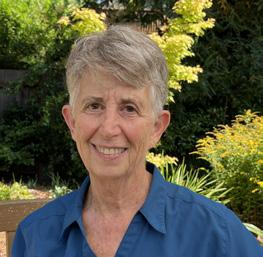
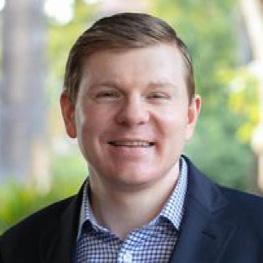
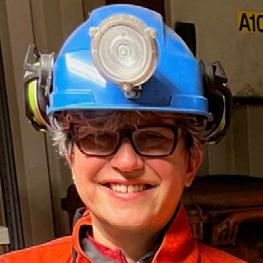
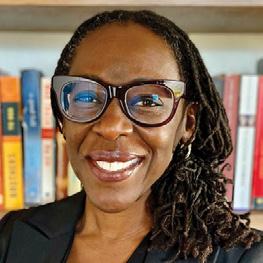
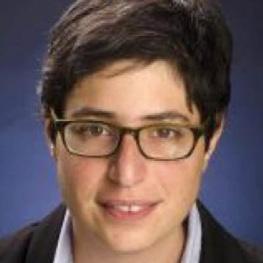
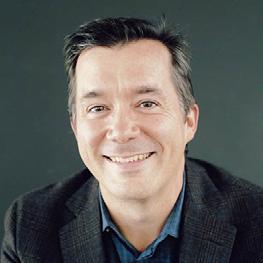
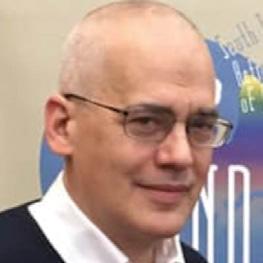
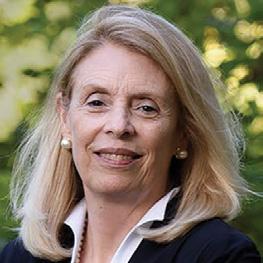
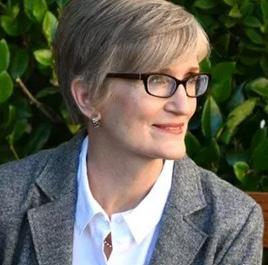
Reagan Foundation 2025 Age of Reagan Conference Book Prize
Jennifer Burns
Milton Friedman: The Last Conservative
Oral History Association 2024 Article Award
Estelle Freedman
“Not A Word Was Said Ever Again”: Silence and Speech in Women’s Oral History Accounts of Sexual Harassment
Phi Beta Kappa
Jonathan Gienapp | Teaching Excellence Award
African Studies Association 2024 Best Book Award
Gabrielle Hecht
Residual Governance: How South Africa Foretells Planetary Futures
American Anthropological Association 2024 E. Ohnuki-Tierney Book Award for Historial Anthropology
Gabrielle Hecht
Residual Governance: How South Africa Foretells Planetary Futures
American Historical Association Martin A. Klein Prize in African History
Rachel Jean-Baptiste
Multiracial Identities in Colonial French Africa: Race, Childhood, and Citizenship
PEN/John Kenneth Galbraith Award for Nonfiction
Ana Minian
In the Shadow of Liberty: The Invisible History of Immigrant Detention in the United States
Charles Babbage Institute 2025 CBI Human-Computer Interaction History Prize
Thomas Mullaney
The Chinese Computer: A Global History of the Information Age
LGBTQ+ History Association 2025 John Boswell Prize
Matthew Sommer
The Fox Spirit, the Stone Maiden, and Other Transgender Histories from Late Imperial China
Stanford Faculty Women’s Forum
Rachel Jean-Baptiste | Outstanding Leader Award
Londa Schiebinger | Lifetime Achievement Award
Kathryn Starkey | Outstanding Mentor Award
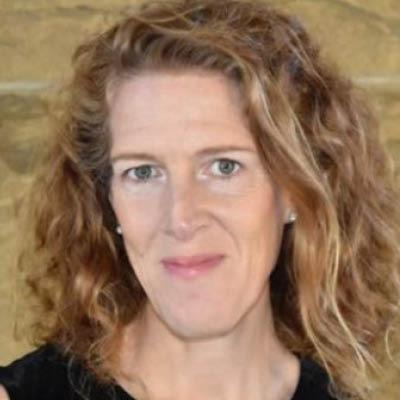
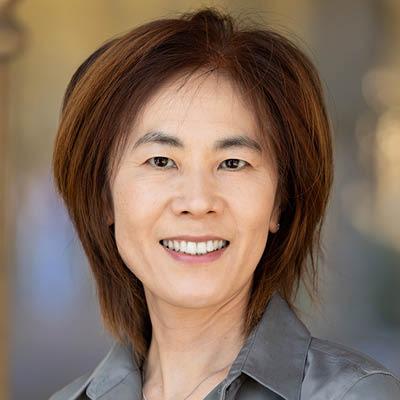
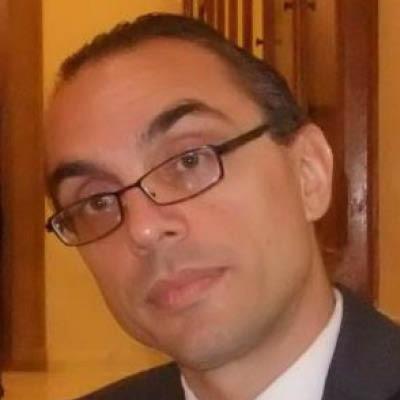
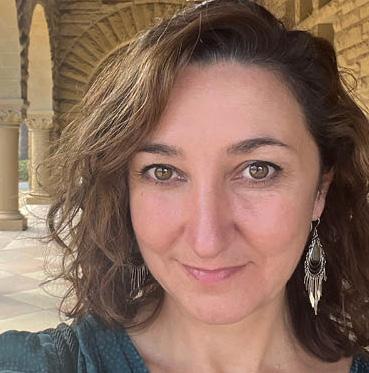



Green Library Special Collections: The magic of medieval manuscripts by Helen Katz | Stanford Daily
A ‘deep time revolution’ paved the way to American modernity, Stanford historian asserts by John Sanford | Stanford H&S
Historian Jonathan Gienapp challenges originalist interpretations of the Constitution by Cameron Scott | Stanford H&S
Author Annette Gordon-Reed talks to students about citizenship, censorship, and facing the past by Alex Kekauoha | Stanford Report
History in the Policy Room by Judy N. Liu | The Stanford Daily
Science and tech need intersectional analysis for accuracy, scholars say by Sara Zaske | Stanford H&S
Stanford historian’s book on immigration wins PEN America nonfiction award by Paul L. Underwood | Stanford H&S
Gordon H. Chang explores history through a personal lens in new book of essays by Paul L. Underwood | Stanford H&S
More interviews, features, and news items can be found here
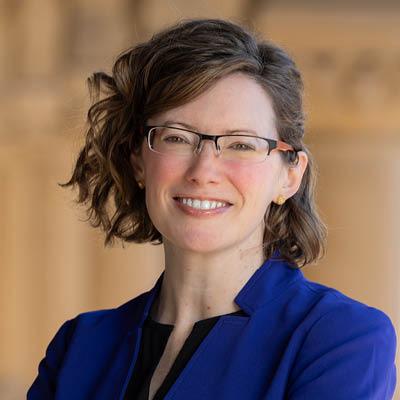
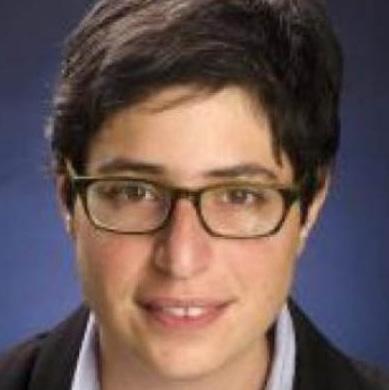
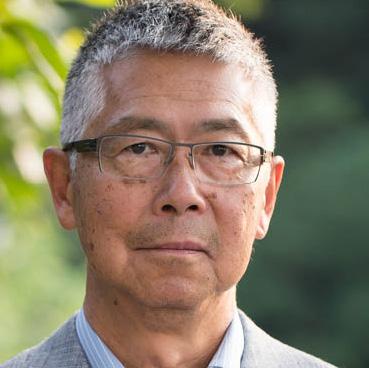
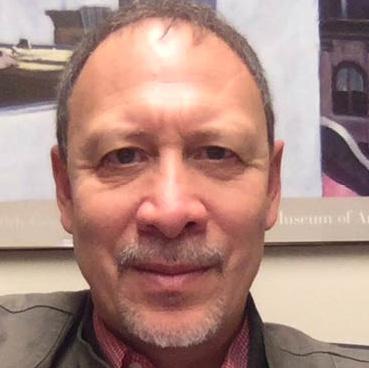
How the New World Became Old: The Deep Time Revolution in America
Caroline Winterer
Princeton University Press
Against Constitutional Originalism: A Historical Critique
Jonathan Gienapp
Yale University Press
Visualizing Russia in Early Modern Europe
Nancy Kollmann
Cambridge University Press
War, Race, and Culture: Journeys in Trans-Pacific and Asian American Histories
Gordon Chang
Stanford University Press
Religion, Politics and the Public Sphere, 1500-1850
David Como
Boydell Press
A World in the Making: Urbano Monte’s Global Map circa 1587
Paula Findlen
Stanford University Libraries
Territorial Imaginaries: Beyond the Sovereign Map
Kären Wigen
The University of Chicago Press
What is Ancient History?
Walter Scheidel
Princeton University Press
The Revolution to Come: A History of an Idea from Thucydides to Lenin
Dan Edelstein
Princeton University Press
Translations
Residual Governance: How South Africa Foretells Planetary Futures (Spanish)
Gabrielle Hecht
Duke University Press
Secret Cures of Slaves (Japanese) Londa Schiebinger
Kosakusha Publishing Company
In Winter quarter, undergraduate showcase exhibit Maps Talk Back: Undergraduate Maps of Stanford in Green Library featured a selection of student counter-maps of Stanford campus produced since 2013 as part of in Dr. Kären Wigen’s introductory seminar History 95: Maps in the Modern World. These original works are compiled into a counter-atlas and are viewable by request at Branner Earth Sciences Library & Map Collections.
• Sara Boyers (’26), Main quad buildering: classic climbs and new lines (below)
• Lydia Wei (’24), Stanford: campus of the unknown (right, top)
• Ethan Ball (’27), “Disabled students don’t exist on the weekends” (right, bottom)
Learn more about this collection here
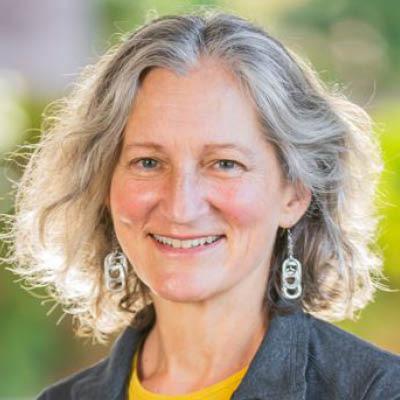
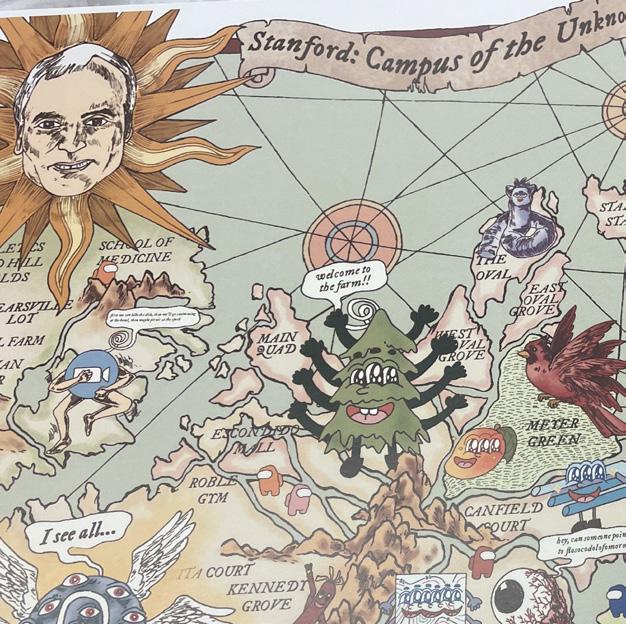
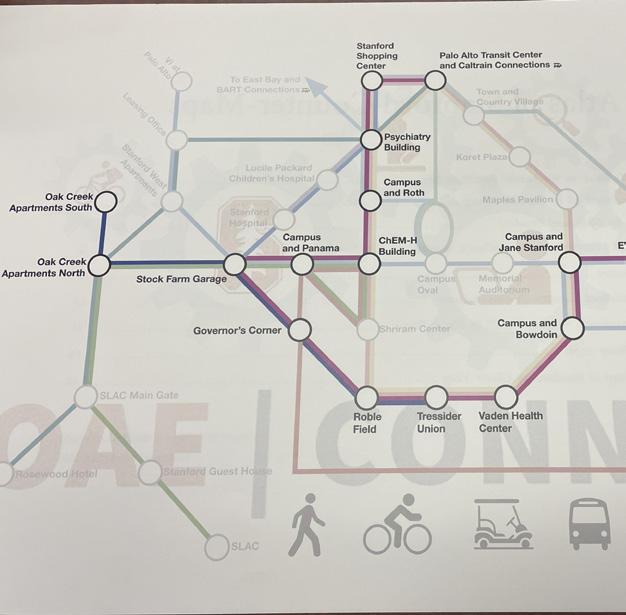

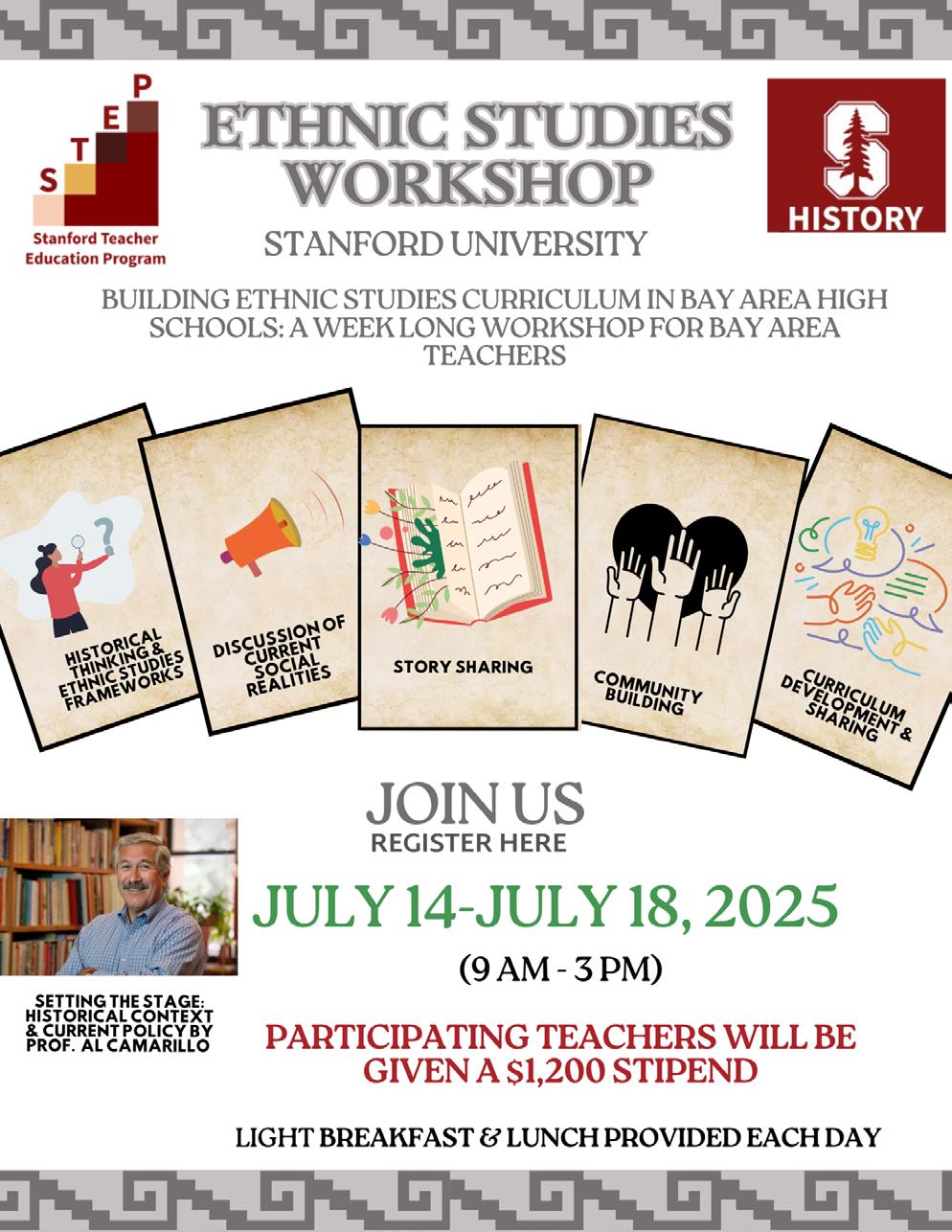
Travel the World with Stanford Historians
September 10-17 | New England
Caroline WInterer
September 21 - October 10 | Central Asia
Bob Crews
October 14 - 31 | Melanesia
Norman Naimark & Katherine Jolluck
November 8 - 20 | Japan
Kären Wigen
Click here for information on these trips and more!
This year, we hosted the 50th annual meeting of The Pacific Coast Conference on British Studies (PCCBS) at History Corner in March 2025. The conference brought more than 100 scholars from the United States, England, Canada, Italy, India, and Taiwan together for eighty presentations and two plenary sessions, where they engaged with the social and economic history of the British Empire from the early modern era to today.
The conference featured two plenary sessions with Professors Michael Questier (University of Durham) and Susan Zieger (UC Riverside), and also included a memorial for the late Emeritus Professor Paul Seaver of Stanford History.
PCCBS is a regional affiliate of the North American Conference on British Studies (NACBS), a scholarly society dedicated to all aspects of the study of British history, literature, society and culture. The conference was supported by Sidney Stern Memorial Trust, Anglo-California/Stansky Fund for British Studies at Stanford, and Department of History.
For additional information on PCCBS, an archive of past conferences, and more, please visit https://pccbs.org
The 2025 conference was organized by Professor David Como, the Joan Danforth Professor of History at Stanford University, and Stanford University graduate student Courtney MacPhee.
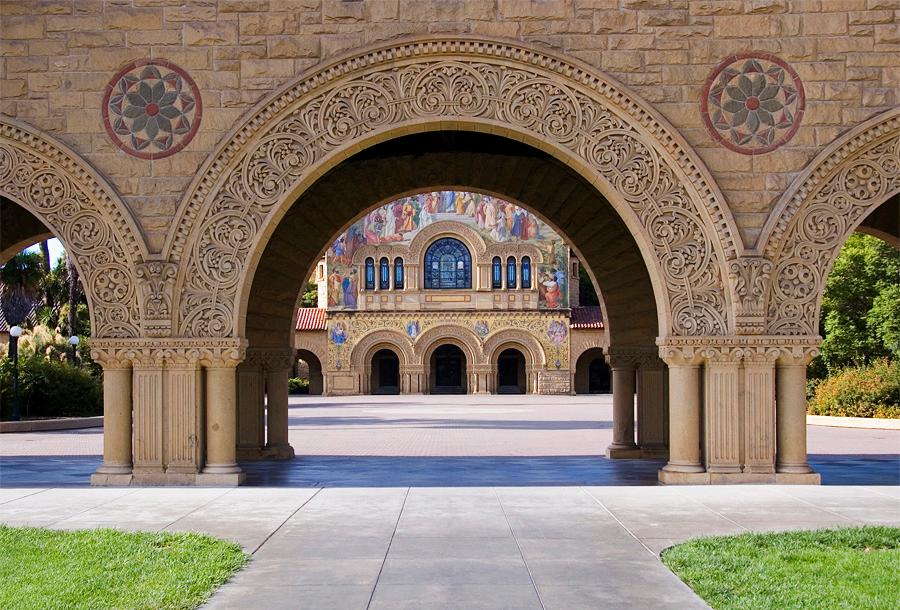
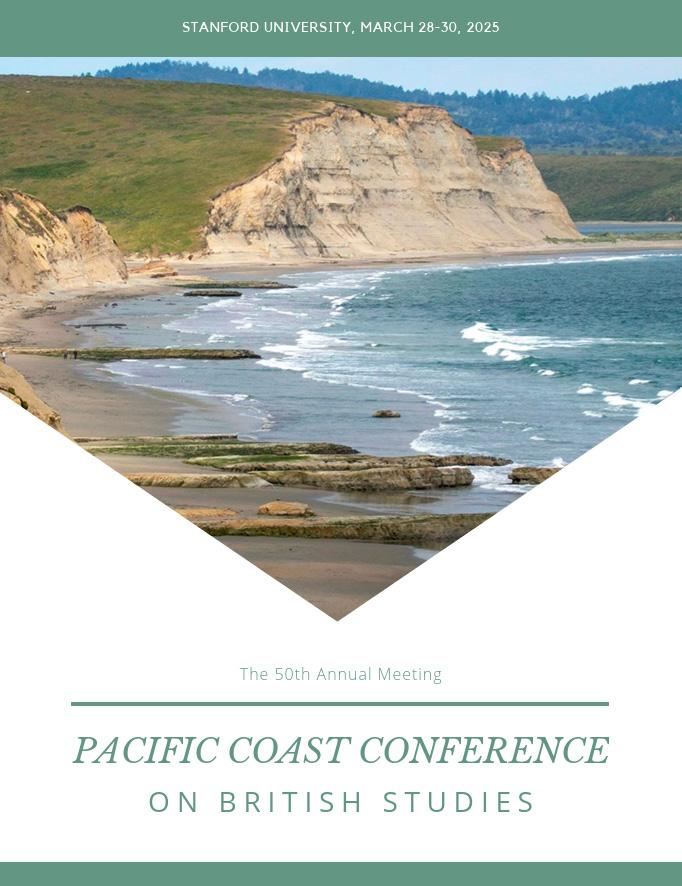
These fellowships are designed to assist graduate student research on the history of Britain and the British Empire (or alternatively, for essential research on other fields tied to UK repositories). Funds may be used to support archival research OR to obtain materials, order digital copies, secure electronic editions, and pursue other research opportunities

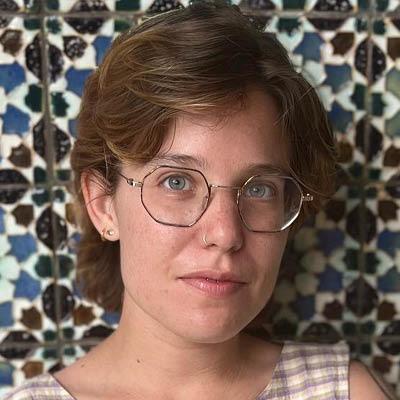

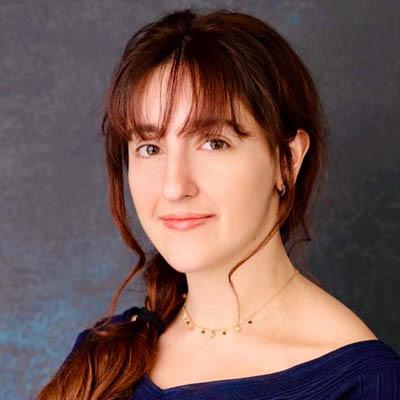
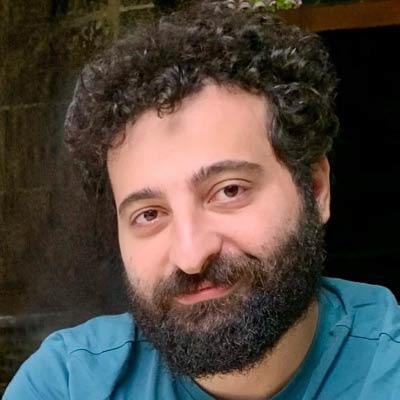
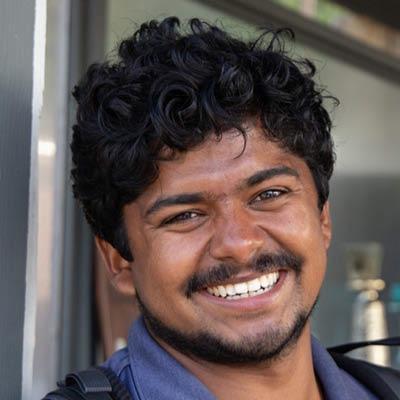
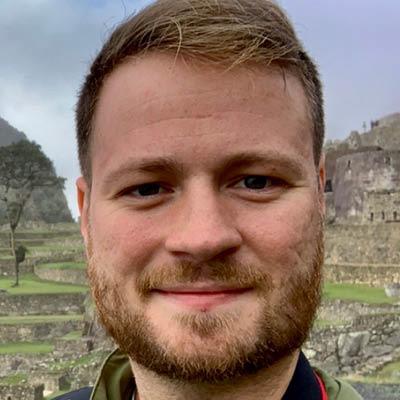
In March 2025, Stanford’s History Department celebrated the spring equinox by hosting a hands-on workshop on astrolabes—ancient astronomical instruments invented in ancient Greece, widely used in the Islamic world during the medieval and early modern periods, and later adopted in Western Europe before gradually losing popularity by the 17th century.
The workshop was conducted by Federico Cortigiani, a fourth-year History PhD researching the history of science and environment in the early modern Ottoman Empire, and Fyza Parviz Jazra, a first year History PhD in the field of History of Science, who works on astronomical knowledge exchange between Western Europe and the Islamic world in the early modern era. Read more here.
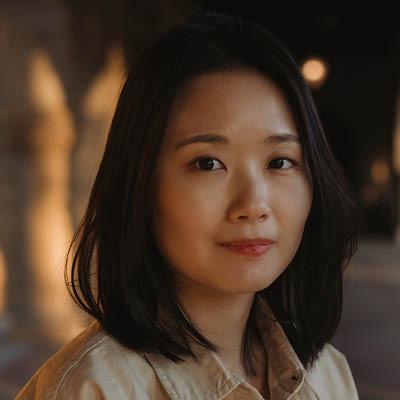
Yeseul Byeon
4th Year PhD
2025 American Historical Association
Bernadotte E. Schmitt Grant: Paper Cuts and Paper Ties: Media and Partition in South Korea
Best Graduate Teaching of an Undergraduate Seminar: How to Divide a Country: The Making of Two Koreas in the Post 1945 World (History 92S)
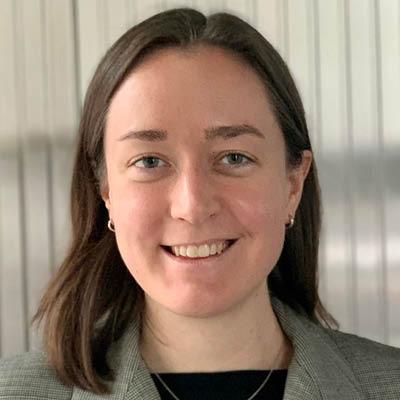
Magdalene Zier
6th Year PhD
2025 American Historical Association
Littleton-Griswold Research Grant: Women at the Bar: Forging Feminism through Law and Liquor, 1873–1973
Article: Journal of the Gilded Age and Progressive Era: Anthony Comstock and the Comstock Laws
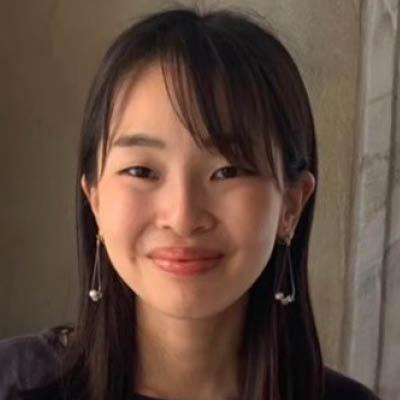
Narusa Yamato
6th Year PhD
Interview: Studying Japanese History through Commodities : An interview with award-winning PhD Candidate Narusa Yamato
Association for Asian Studies Northeast Asia Council’s Best Graduate Student Paper Prize: The Global Making of a Japanese ‘Holstein Island’: Silk, Milk, and Hachijō Island in Imperial Japan

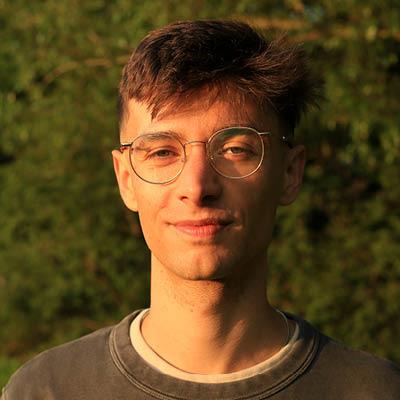
Jon Cooper Interview: “Dealing with Money”: PhD Candidate Jon Cooper on Economic Theology and the Role of Artificial Intelligence in History
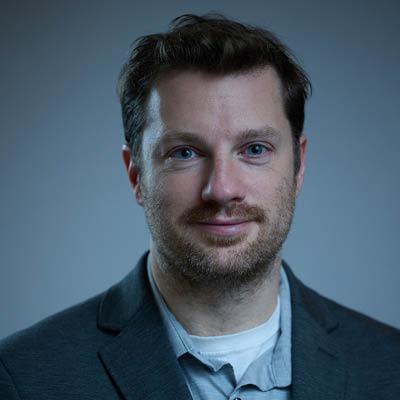
Austin Clements Interview: Religion and Right-wing movements in early 20th century U.S.: An interview with PhD Candidate Austin Clements
Best Written Dissertation Prize
Greg Priest
Charles Darwin’s Science of History
Excellence in First-Time Teaching as a TA
Jordan Virtue
Nineteenth Century America (History 150B)
SHC Mellon Dissertation Fellowship
Christian Robles-Baez
Sonya Schoenberger
Adele Stock
SHC Next Generation Scholars Fellowship
Farah Bazzi
Fulbright Scholarship
Sina Salessi
Mabelle McLeod Memorial Fund Scholarship
Jon Cooper
Hannah Johnston
Thomas D. Dee II Graduate Fellowship
Aliyah Dunn-Salahuddin
African American Intellectual History Society
Du Bois-Wells Graduate Student Paper Prize
Matthew Randolph
Migrating mariners: African American Emigration, Maritime Poetics, and the Afterlives of Slavery on Caribbean Shores
G.J. Pigott Scholars Program Award
Karventha Kuppusamy
History of Science Dissertation Fellowship in History of Science and Allied Fields
Kyle Harmse
Clayman Fellowship
Magdalene Zier
Ana Nunez
France-Stanford Center
James Baldwin Essay Prize
Audrey Martel-Dion
Undefined Sexes in Undisclosed Locations: Displacing the Hermaphrodite Society in Early Modern French Thought
France Stanford Center
Louise Bourgeois Essay Prize
Lucy Stark
Capturing, Selling, Using, and Liberating: The Four Acts of Senegalese Childhood Slavery in the Late 1850
Africa
Marsha Morabu (MA)
Early Modern Europe
Alara Aygen (PhD)
Xin Zheng (MA)
East Asian
Linxi Cai (PhD)
History of Science, Technology, Environment and Medicine
Longkai Zhang (PhD)
Daniel Kiss (MA)
Ruiji Zhang (MA)
Latin America
Joaquin Lara Midkiff (PhD)
Medieval
Anthony Klein (MA)
Marguerite Vasy (MA)
Ottoman Empire and Middle East
Anwar Haneef
Russia & Eastern Europe
Margaret Borozan (PhD)
South Asia
Bhavya Chauhan (PhD)
Muhammad Haram Gulzar (MA)
Transnational, International & Global History
Mehdi Hakimi (PhD)
Yanling Feng (MA)
Teddy Hickenlooper (MA)
Ellie Luchini (MA)
United States
Elizabeth Carson Eckhard (PhD)
Baird Johnson (PhD)
Ayesha Pasha (PhD)
Lindsey Allebest (MA)
Mikaela Gerwin (MA)
Emmerson Johnston (MA)
Tess Stapleton (MA)
William Stockwell
The Unexpected Journey of Asdur Ladefian
April Pacheco
Excessive Styles, Defiant Identities
Inés Salter-Martin
Revisiting the Valley of the Fallen’s History
Julia Lasiota
From the Life of Polish Refugees in the Middle East and East Africa, 1942-45
Moisés Gonzalez De La Rosa
En la Sombra de la Tristeza: A Long History of Mexico’s Dirty War
Nina Nguyen
Menstruation Management Over Time
Oscar Reyes Oyster Farming in Point Reyes
Jessica Susanto
Lipstick Politics: The Politics & Power of Red Lipstick
Luke Campbell
A Perfect Smokescreen
Jacqueline Munis
Subjugation and Resistance: The 1968 Occupation of Wilmington, Delaware
Eliza Sandell
Early Northern California Material History
Zoe Edelman
An Author and her Self-Fashioned Tragic Mulatta: Sinking into Quicksand
Bruce Owdom
A.I. The Modern Homunculus
John Shelburne
All My Love, Jack
Nilou Davis
“Free from Death, Free from the White Folks, Free from Everything”: African American Methodism and Heavenly Citizenship in Antebellum Virginia
Zelig Dov
Robert M. Golden Medal for Excellence in the Humanities and Creative Arts
Alexa Kupor
James Birdsall Weter Prize for Outstanding History Thesis
Novia Liu
Oral Communication Award for Excellence in Honors Thesis Presentation
John Shelbourne
Award for Excellence in Creative Capstone Projects
April Pacheco
Award for Innovation in Creative Capstone Projects
Zoe Edelman
Award for Outstanding Presentation of Creative Capstone Projects
Samia Rana
Carl N. Degler Prize (Herodotus)
Novia Liu
Marguerite Vasy
J. E. Wallace Sterling Award for Scholastic Achievement
Caspar Griffin
Hoefer Prize for Excellence in Undergraduate Writing
Jessica Susanto
Stanford Award of Excellence
Adrian Feinberg
2025 James C. Gaither Junior Fellowship
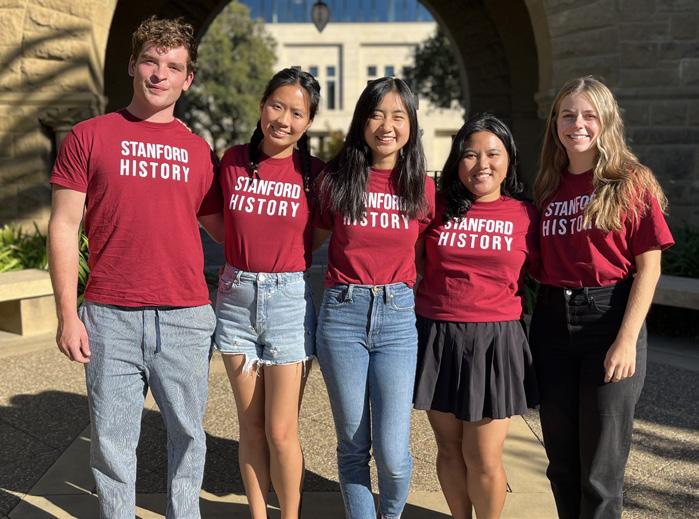
2024-2025
Caspar Griffin, Judy Liu, Novia Liu, Jessica Susanto & Anna Moller
Draper Dayton
Where the Frontier Ends: Land Conflict, Labor, and the Natural Environment in Colonial St. Vincent
Evan Miksovsky
New World Opium: Contested Narcotics in the United States and Mexico, 1848-1909
Arynn Carty
Masculinity and Femininity in Alpha Phi Alpha and Alpha Kappa Alpha, the First Black Greek Letter Organizations, 1905-1940
Marguerite Vasy
The World of Pope Gregory VII’s Letters
Anna Moller
A Comparative Analysis of the Imaginary Jew in Medieval Europe
Zelig Dov
In the Shadow of Memory: The Long Road to a Berlin Museum about the German Expellees
Novia Liu
Constituting a Republic: Mixed Government in the American Founding Era, 1776–1796
Lexi Kupor
“No Fetters in the Bay State”: The Politics of Massachusetts Women’s Antislavery Petitions, 1830-1850
Samiya Rana
In the Darkness, a Flash of Light: The Emergence, Exposure, and Erasure of Prison Farm Labor under Apartheid
Arjun Maheshwari
Space Hubris: Neoliberal Statecraft and the Making of American Commercial Space Policy, 1978-1992
Lily Forman
“Israel Changed Us as Jews”: Israel in San Francisco Jewish Education, 1953-1977
Samiya Rana
The Baas Digs a Shallow Grave: The Political Economy of South African Prison Labor, 1947-1959
Alexa Kupor
Petitioning on the Periphery: The Politics of Women’s Petitions to Repeal the Massachusetts Intermarriage Ban, 1839-1843
Emily Schrader
“The Jews” and “The Media” as “The Enemy”: President Nixon’s Private Vilification of Jews and Public Denunciation of Journalists
Diana Baszucki
Vanishing Bison: How Evolutionary Thought Paved the Path to Near Extinction
John Rigsby Shelburne
Press and Perception: The Role of Newspapers in Shaping Edmund Burke’s Legacy
Zelig Dov
From Restitution to Recognition: The Federation of Expellees and the Transformation of the German Vertreibung Discourse, 1990-2000
Katharine Sorensen
“Arma Crucemque Cano”: An Examination into How Early Christian Leaders Invoked Vergil’s Aeneid and “Eclogue IV”
Christina Cheng
Closing the Last Safe Haven: The Shanghai Jewish Community’s Responses to European Jewish Immigration in World War II

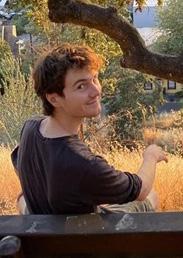
Gabrielle Edelin
National African American Museum of History and Culture Washington, D.C.
Read the report
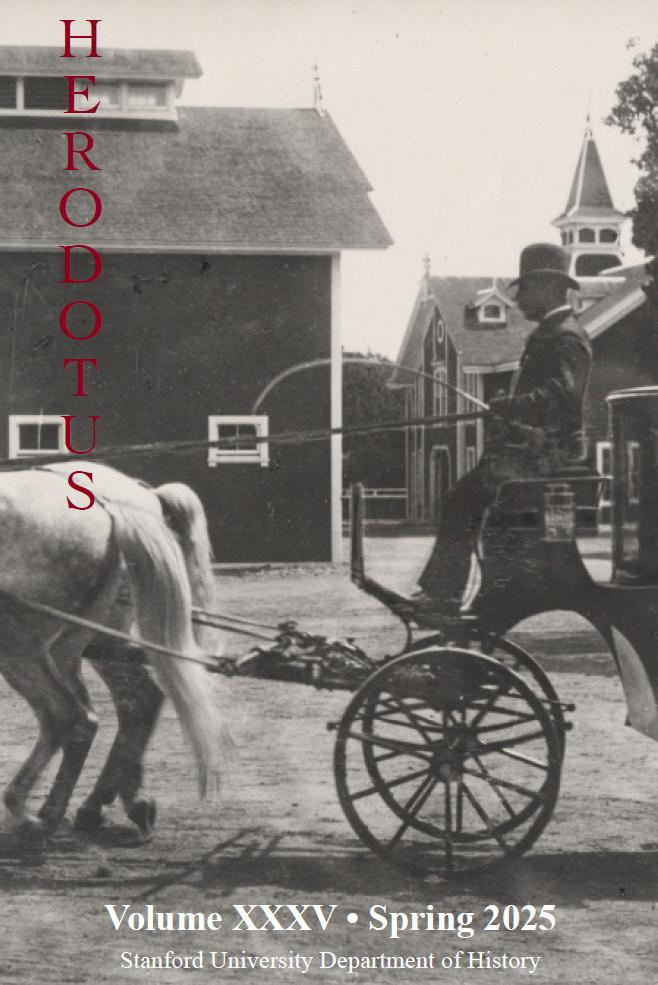
Read Volume XXXV of Herodotus here
Unearthing the History of Slave Experiences in Saint-Domingue through Iconography: Building the Archives
Faculty Mentor: Rachel Jean-Baptiste
Undergraduate RA: Michelle Kalu
A Concise History of the Japanese Empire
Faculty Mentor: Jun Uchida
Undergraduate RA: Kevin Chan
OpenGulf: Mapping Colonial Imaginaries of the Arabian Peninsula and Persian Gulf
Faculty Mentor: Nora Barakat
Undergraduate RA: Cate Greenman
William Heafy
Northwest Indian Language Institute
University of Oregon, Eugene, OR
Read the report
Police Constables in Colonial Eastern India
Faculty Mentor: Parth Shil
Undergraduate RA: Samiya Rana
Germany and The Cold War in the 1950s
Faculty Mentor: Steven Press
Undergraduate RA: Emma Esposito
History is not the study of the past.
History is the study of the present—that just happens to be past. Gone. Separated from us, perhaps by mere seconds. Decades and centuries. Sometimes by millennia. These thin slivers of time where all human experience takes place. History studies the “here and now” that is dead and gone, using just the fragments that were left behind.
History is the study of Past Presents.
And this is where things get really interesting.
- Professor Thomas Mullaney
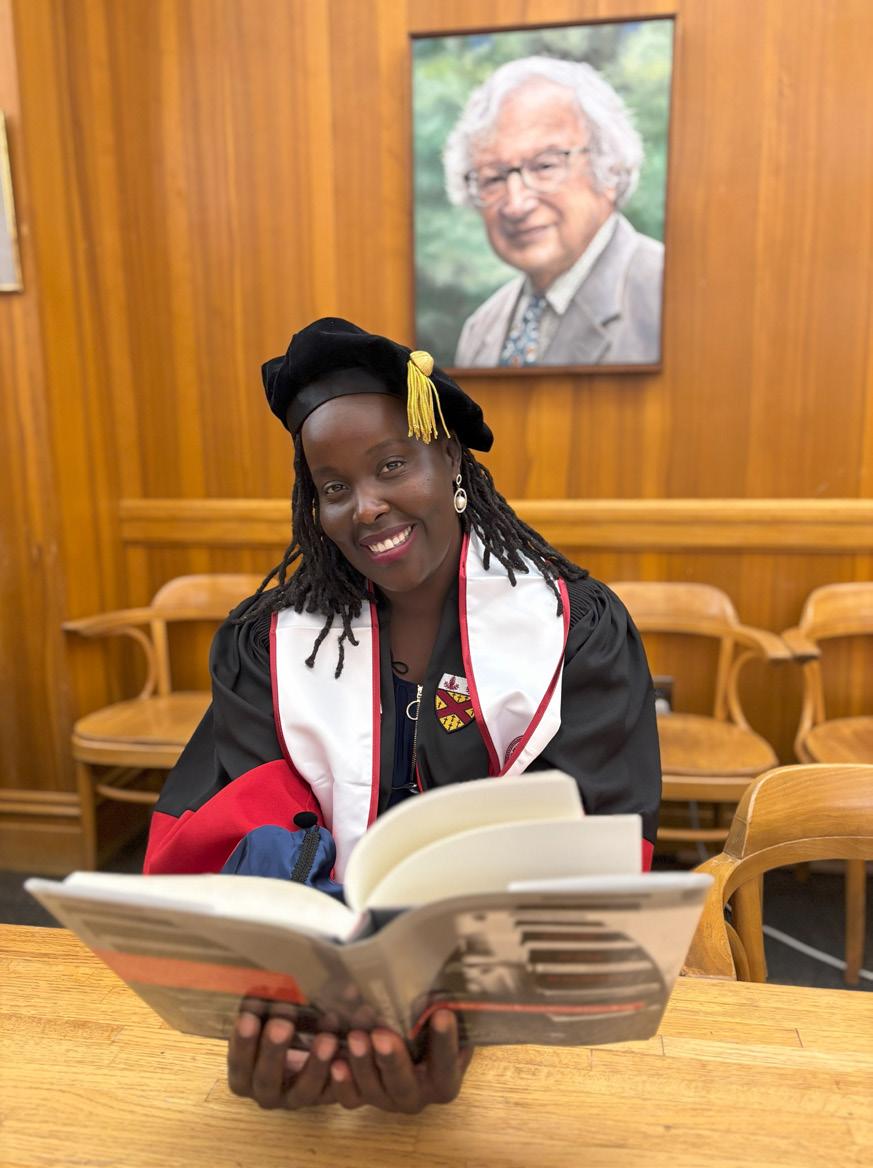
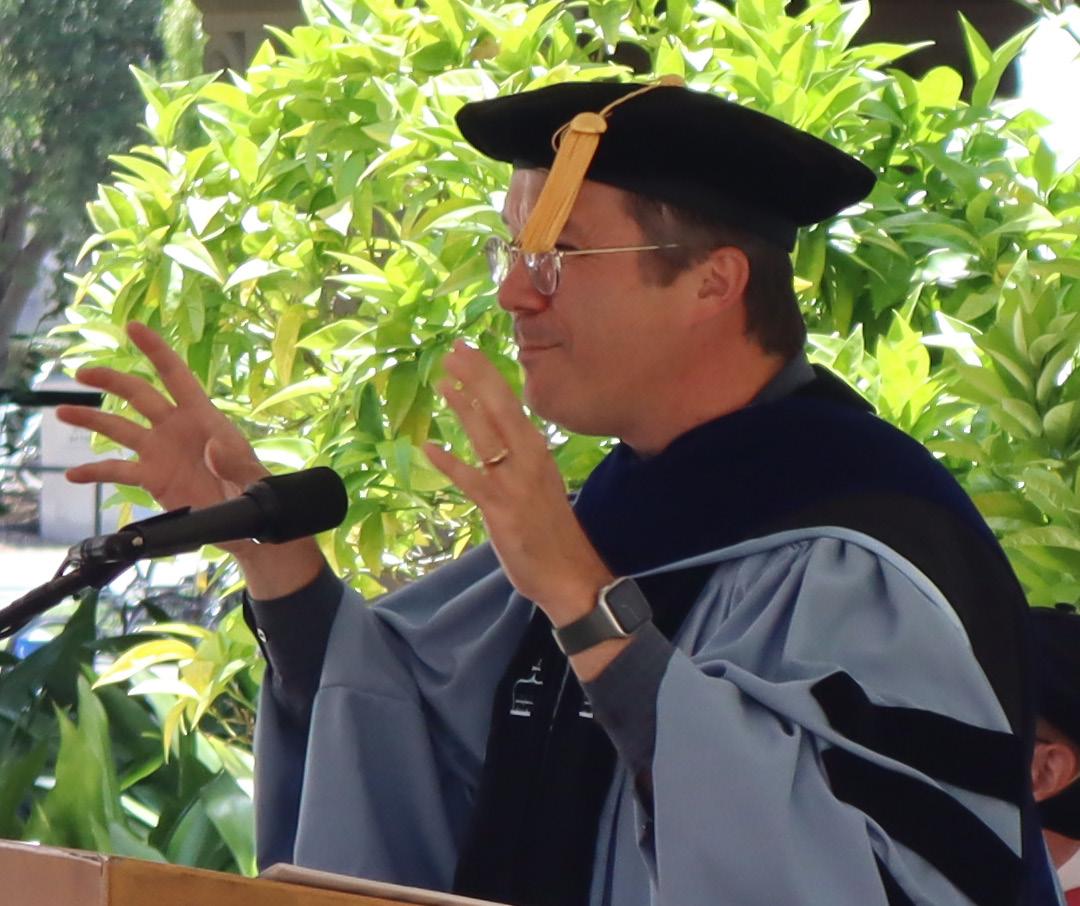

Our gathering here today is part of one last crucial ritual of grad school I would like to share with you. During our time at Stanford, we learned to mark our small and big milestones with gratitude and celebration. We baked muffins after finishing papers, went on hikes after completing our qualifying exams, and my personal favorite, read novels in coffee shops after defending our dissertations... These rituals helped us let go of projects, allowed us to thank those who helped us along the way, and prepared us for what was coming next.
- Dr. Caryce Chepchirchir Tirop
In doing history, we seek to understand people not as caricatures of our fears or mirrors of ourselves, but rather as their own thinkers and actors. To enrich our knowledge of the past, we hear, or rather read, what another human has to communicate, and we take careful notes. We are a humanities subject through and through, as we analyze and recognize humanity. Compassion, not hatred or adulation, is our fundamental principle, guiding us towards a clearer vision of eras gone by.
- Novia Jichu Liu
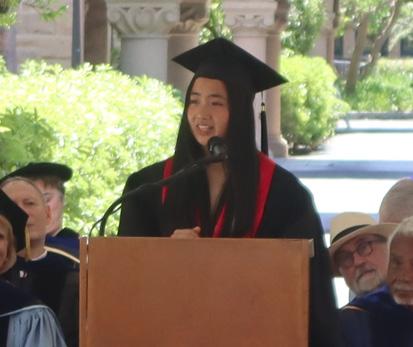
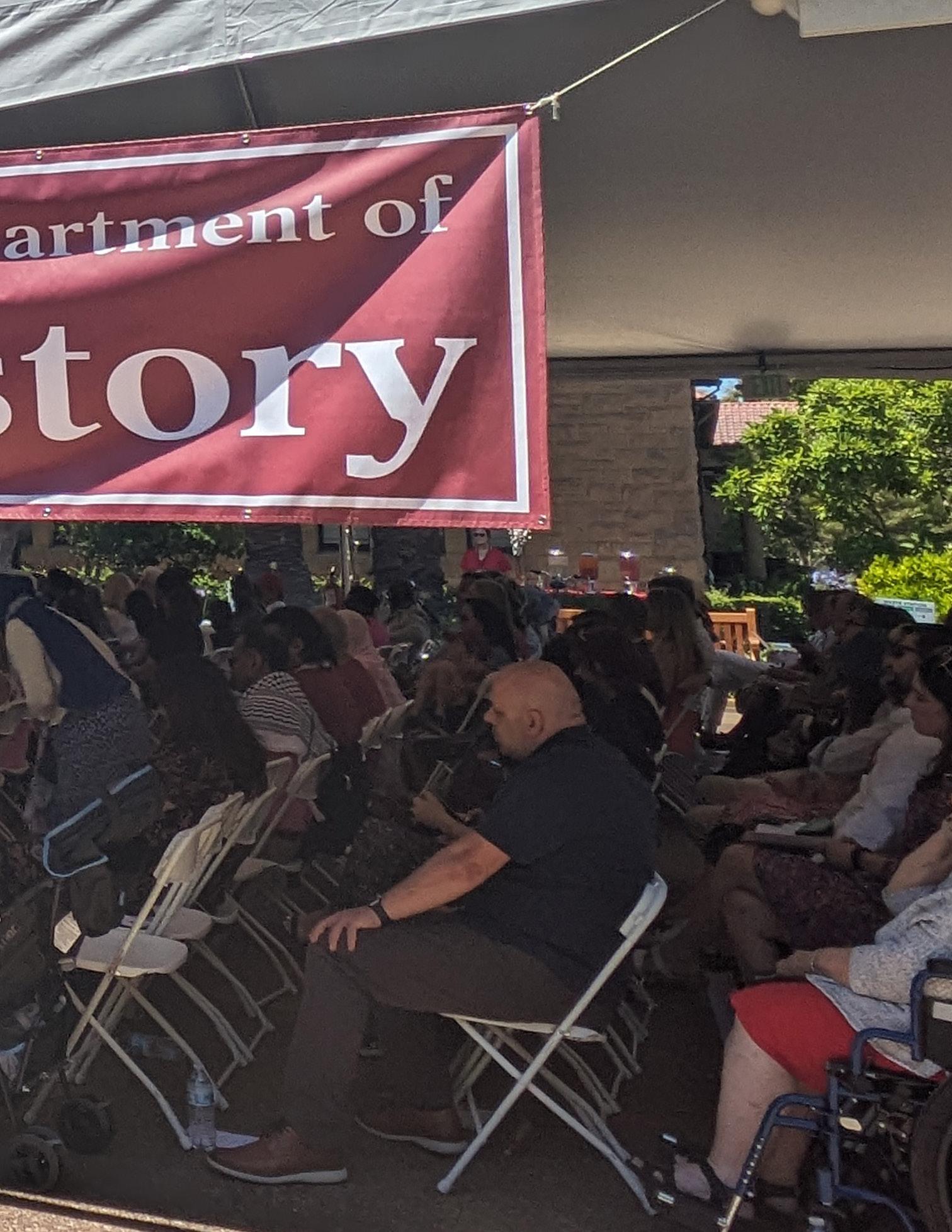
Arynn Carty
Nilou Davis
Draper Dayton (Honors)
Zelig Dov (Honors)
Zoe Edelman
Lily Forman (Honors)
Moisés González De La Rosa
Oscar Hodder
Alexa Kupor (Honors)
Julia Lasiota
Novia Jichu Liu (Honors)
Ellie Luchini
Arjun Maheshwari (Honors)
Daniel McFadden
Evan Miksovsky (Honors)
Anna Moller (Honors)
Jacqueline Munis
Nina Nguyen
Bruce Owdom
April Pacheco
Samiya Rana (Honors)
Ines Salter
Eliza Sandell
John Shelburne
William Stockwell
Theo Strauss
Jessica Susanto
Marguerite Vasy (Honors)
Anna Wang
MINORS
Ryan Beyer
Ingrid Chen
Adrian Feinberg
Raghav Ganesh
Vedant Garg
Scott Ingall
Janene Kim
Jacob Maikkula
Emma Martinez Sutton
Temitope Oshodi
Nicholas Reisner
Andrew Solganik
Julia Steinberg
Sherry Xie
Josh Yoon
MA
Oluwatobi Bankole
Ethan Dang
Kaitlynn Norton
Suchang Wu
Lauren Adams
Redemptive Transgressions: Sexual Boundary-Crossing in Saints’ Lives and Religious Literature, ca. 1050-1250
Advisor: Professor Fiona Griffiths
William Tanner Allread
Republics Within a Republic: Tribal Constitutions and Sovereignty Conflicts in the Era of Southern Indian Removal
Advisors: Professors Jonathan Gienapp & Kathryn Olivarius
Lane Baker
The Lords of Little Egypt: Romani Immigrants and Travelers in the Holy Roman Empire, 1417–1498
Advisor: Professor Rowan Dorin
Alin Theodor Constantin
Communism and Jewish Intellectuals in Romania
Advisor: Professor Steven Zipperstein
Claudius Kim
Revolution on the Move: Korean Migrants and Sino-Korean Relations in Trans-War East Asia, 1932-58
Advisors: Professors Yumi Moon & Thomas Mullaney
Natalie Larah
Strange Indirections: Intellectual War Work and the Doctoring of American Democratic Thought, 1940-1946
Advisor: Professor Jennifer Burns
Sierra Nota
Expropriating Ukraine: State Property Regimes from the Russian Empire to the Maidan
Advisor: Professor Amir Weiner
Greg Priest
Charles Darwin’s Science of History
Advisor: Professor Jessica Riskin
Matthew Alexander Randolph
Harboring Freedom: African American Migration and Imperial Rivalries in Samaná Bay, 1822-1871
Advisors: Professors Zephyr Frank & Allyson Hobbs
Caryce Chepchirchir Tirop
Running the Nation: Athletics and the International Politics of Decolonization and Nation Building in Kenya, 1945-2000
Advisors: Professors Joel Cabrita & Richard Roberts (Emeritus)
Morgan Tufan
Kurdish Autonomy and the Making of the Ottoman-Safavid Frontier in the Sixteenth Century
Advisor: Professor Ali Yaycıoğlu
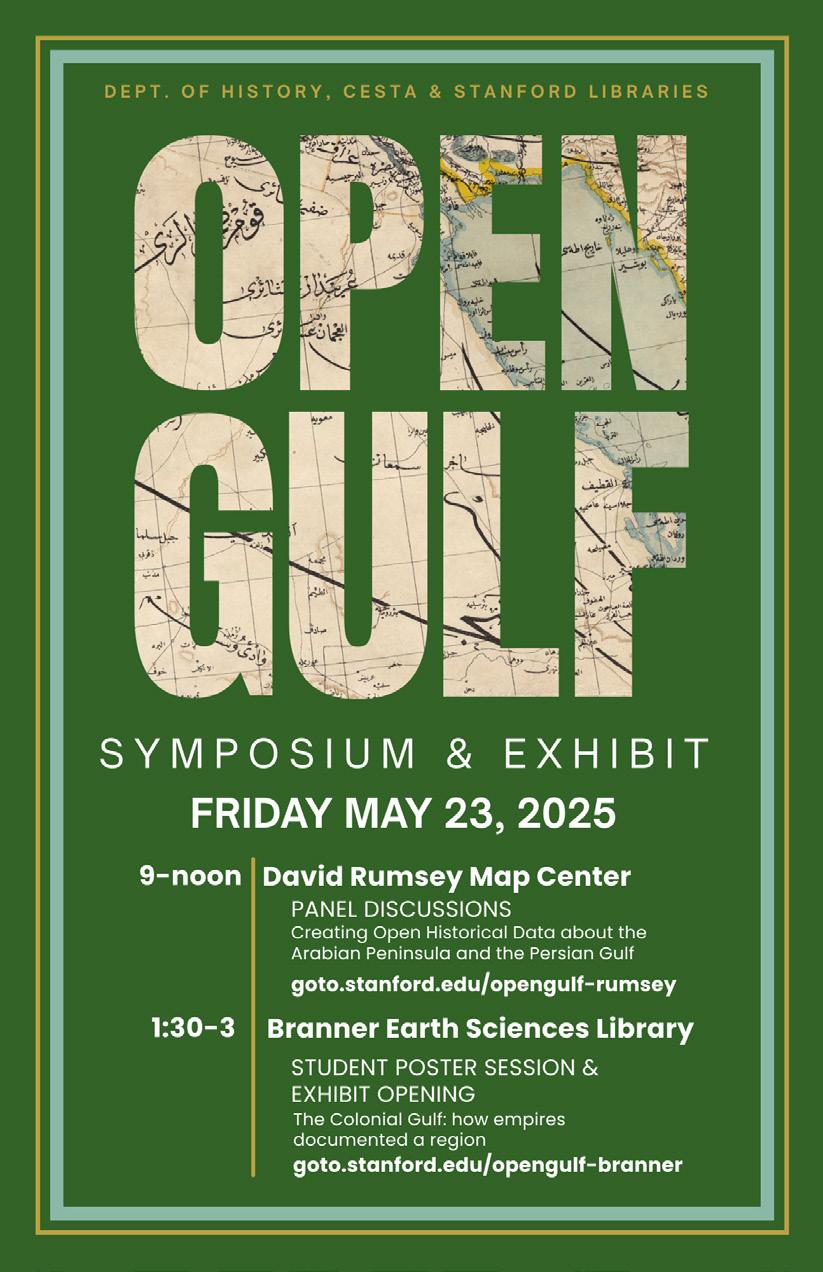

OpenGulf is a transdisciplinary, multi-institutional research group that applies digital methods to the study of the Arabian Peninsula, Iraq and Iran founded by History faculty member Nora Barakat and David Wrisley, Professor of Digital Humanities at New York University Abu Dhabi.
In May 2025, the Center for Spatial and Textual Analysis, Branner Earth Sciences Library & Map Collections and the David Rumsey Map Center hosted a symposium celebrating OpenGulf’s completion of a large dataset of historical place names found in an early twentieth-century British gazetteer of the Persian Gulf, Arabia and Oman.
The symposium featured discussions about OpenGulf’s collaborative workflows and methods, digital historical research, and the opening of the exhibit The Colonial Gulf: How Empires Documented a Region installed in Branner Library which is on view into Fall 2025. The exhibition Storymap created by History undergraduate Germaine Soliman, is also available to view digitally.
The exhibit displays historical material from the Ottoman, British and American imperial archives, including maps and books from the collections of Branner Library and the David Rumsey Map Center alongside reproductions of OpenGulf’s digitally-produced maps. Stanford History and International Relations undergraduate majors Iman Deriche, Khosiyat Oripova and Germaine Soliman presented research on colonial British discourse on climate and religious affiliation in the Arabian Peninsula, Iraq and Iran and their work creating and visualizing datasets with the research group, and History graduate student Mustafa Günaydı presented digital comparisons of Ottoman and British knowledge production on the historical geography of Iraq.
This website, spearheaded by graduate students Julia Fine, Miri Powell, & Mariana Calvo, aims to contribute to the environmental humanities at Stanford, and beyond, through programming events, workshopping in-progress scholarship, building peer networks, and sharing resources.
Visit the website here
The Senegal Liberations Project seeks to analyze a register of slave liberations in Senegal between 1857 and May 1903 held at the National Archives of Senegal. This source consists of twenty record books which contain evidence of 28,421 liberations.
Organized by Professor Emeritus Richard Roberts, LMU Bellarmine College of Liberal Arts Professor Rebecca Wall (PhD, 2020), and Becca De Los Santos (BA, 2024)
Visit the website here
In 2010, Tom Mullaney found himself way out in the suburbs of London. A woman there wanted to show him a Chinese typewriter. She was going to be renovating her house soon, she told him, and it needed a new home...
“It was the one machine,” he said recently, “which despite all my cold-calling, all my stalking, was absolutely, 100 percent, definitely gone.”
Read the full New York Times article by Veronique Greenwood here
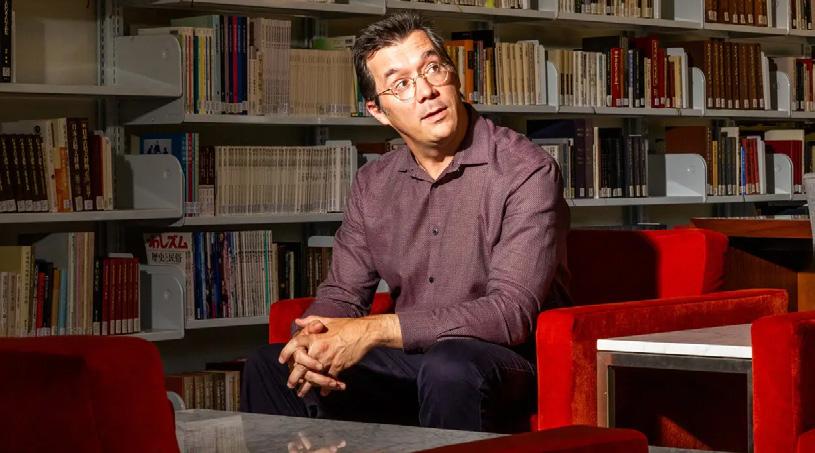
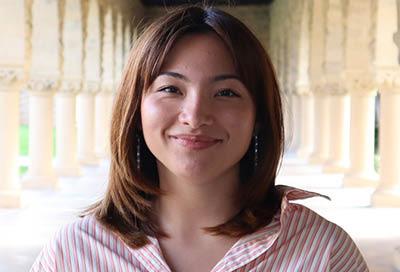
Based in the History Department, Stanford Initiative on Language Inclusion and Conservation in Old and New Media (SILICON) marked a year of extraordinary growth. Deepening its partnership with UNESCO, SILICON sent two student interns to Paris to support the International Decade of Indigenous Languages and the creation of the World Atlas of Languages. SILICON also advanced collaborative research by launching a White Paper with the Institute for Human-Centered AI (HAI). On campus, SILICON successfully hosted Face/Interface 2025, where world-renowned Ivorian designer and Keynote Speaker Dr. Adam Yeo joined an international gathering of scholars, practitioners, and technologists, including UNESCO ADG Dr. Tawfik Jelassi. SILICON’s influence continued to expand with its selection as host for the 2026 Association Typographique Internationale (ATypI) conference, projected to bring more than 600 global attendees to Stanford, and the launch of the Donald Knuth and Charles Bigelow Type Design Incubator (KBI), an ambitious new program for underrepresented global and multi-lingual designers developed in partnership with Letterform Archive and Words of Type. A substantial private gift has funded the program fully for the next two years.
This was also a year of deepened commitments and far-reaching initiatives. SILICON completed the inaugural year of its SILICON–Unicode Summer Internship, doubling the program’s size for 2025 with eight interns supported by the Vice Provost for Undergraduate Education, the Haas Center for Public Service, CS for Social Good, and SSFP. It secured a five-year funding commitment for its pioneering Global Practitioners Program, preparing to welcome a new cohort of innovators in language technology. SILICON was also awarded the Large Propel Grant to translate and digitally integrate nearly 60 predominantly Sub-Saharan African languages. Together, these achievements cement 2025 as a landmark year for SILICON. Click here to learn more.
Audrey Gao SILICON Project Coordinator

This year has been a great year for some new digital history initiatives in the Department of History, and I’ve been thrilled to be a part of them. One of those efforts is piloting Stanford Library “field trips.” I’ve wanted to spark interest among students who are unfamiliar with digital history, as well as demonstrate resources at Stanford Libraries that would be most helpful for their research. In this first year, I organized visits to Branner Earth Sciences Library, David Rumsey Map Center, and Government Documents in Green Library to introduce them to librarians who are happy to assist with their research or provide data and imagery for their research.
I’ve also gotten to work with a few projects, including working with digitally disadvantaged languages, preserving protest music from Afghanistan, and workshopping a process to allow researchers to machine read text on their maps from their browser. I’m thrilled to be able to contribute to these and help our faculty with their incredibly meaningful work.
I once again taught my Crafting Digital Stories class, but this time, it was also included as a capstone-eligible course for the new capstone university requirement. As part of the capstone process, myself, Anne Twitty, JP Daughton, and Kai Dowding worked together to create the Creative Capstone option for students. This allows students to think beyond the research paper in how to write and present historical knowledge. We had our first Creative Capstone showcase at the end of the Spring quarter, and our students created some exciting work. We’ve had ongoing discussions on improvements that can be made for the next iteration, but it was a great start to this initiative!
As always, I am so thankful and excited to be a part of the Department of History and the incredible work being done here, and I’m excited to continue fostering a community of digital history within it.
Anne Ladyem McDivitt Academic Technology Specialist
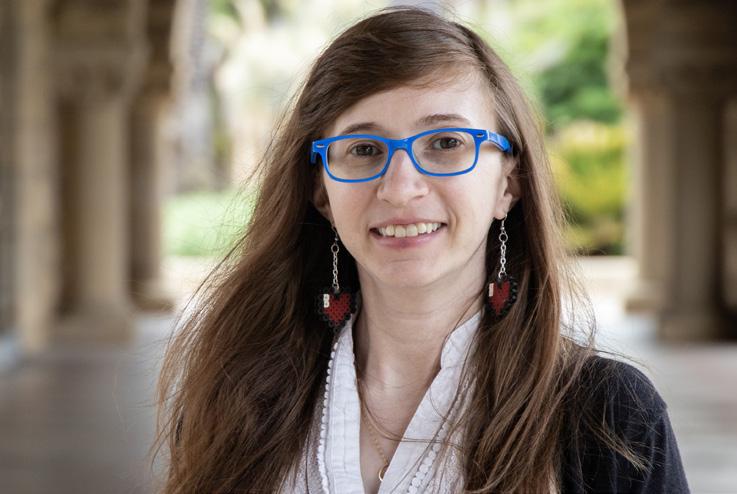

Alumni Interview with Professor Junko Takeda (PhD, ’06)

Alumni Interview with Professor David Fedman (PhD, ’15)
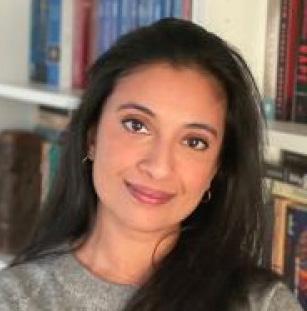
Alumni Interview with Professor Elizabeth Jacob (PhD, ’22)
Alexander Statman (PhD, ’17)
AHA Herbert Baxter Adams Prize
A Global Enlightenment: Western Progress and Chinese Science
Becca De Los Santos (BA, ’24)
AHA Raymond J. Cunningham Prize for Undergraduate Articles
Inversion of the Top-Down Operation: Enslaved Voices and French Abolitionism in 1840s Senegal
Nesrine Mbarek (BA, ’20) Schwarzman Scholar
2025 Graduates Elected to Phi Beta Kappa
Nilou Davis, Zelig Dov, Lily Forman, Alexa Kupor, Novia Liu, April Pacheco, Samiya Rana, Marguerite Vasy, & Anna Wang
His new book, Making Sense of Slavery: America’s Long Reckoning, from the Founding Era to Today, provides a sweeping history of the study of slavery in America from the mid-18th century to the present.
Alumni Interview with Scott Spillman (PhD, ’17)
Making Sense of Slavery: History Workshop with Scott Spillman (PhD ’17)

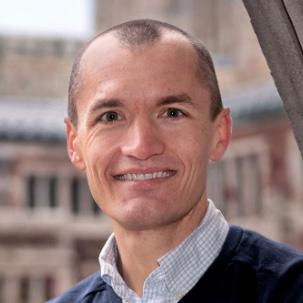
Kathleen DuVal (BA, ’92) | University of North Carolina at Chapel Hill
Her book, Native Nations: A Millennium in North America, has won the:
2024 Cundill History Prize for Native Nations
2025 Bancroft Prize
2025 Pulitzer Prize
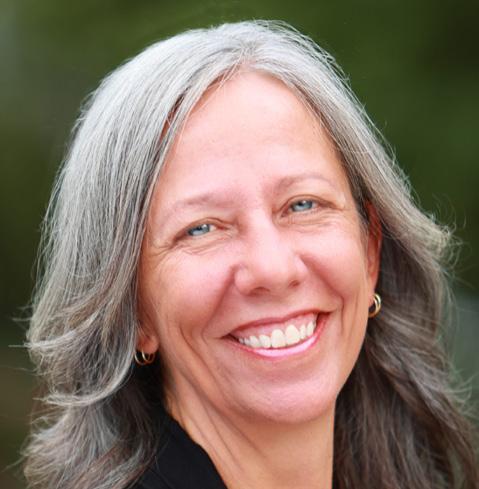
Are you a Department of History alum? Are you interested in sharing your post-Stanford story? Are you conducting some interesting research? Do you want to reconnect with the Department?
If you answered “yes” to any of these questions, we’d love to hear from you!
Please fill out our Alumni Questionnaire and we’ll be in touch soon!
Director of Finance and Operations
Burcak Keskin-Kozat | burcak@stanford.edu
Assistant Director of Finance & Operations
Van-Anh Nguyen | vnguyen@stanford.edu
Faculty Affairs & External Relations Officer
Vivian Beebe Sana | vbeebe@stanford.edu
Assistant Director of Student Services
Art Palmon | apalmon@stanford.edu
Undergraduate Student Services Officer
Kai Dowding | kdowding@stanford.edu
Events & Communications Coordinator
Colin Hamill | chamill@stanford.edu
Department Coordinator & Assistant Building Manager
Maria Moreno-Lane | morenola@stanford.edu
Academic Technology Specialist
Anne Ladyem McDivitt |ladyem@stanford.edu
SILICON Project Coordinator
Audrey Gao |agao@stanford.edu
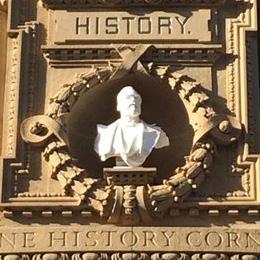
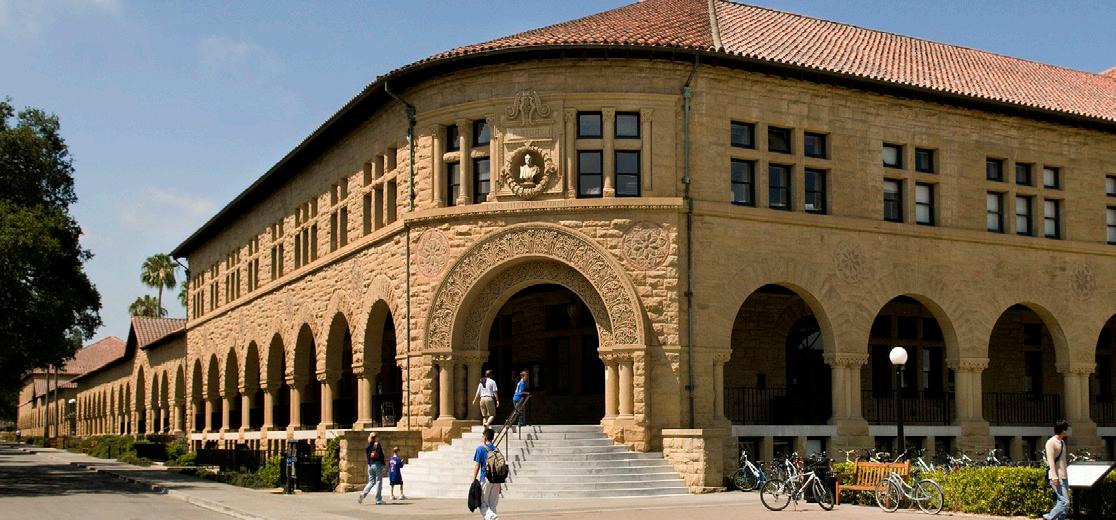

Home to a world-renowned faculty, the Department of History offers programs of study for undergraduate and graduate students. Through a diverse array of courses spanning the globe and ranging from the ancient world to the modern era, students can prepare for variety of fascinating careers and for citizenship in a globalized world.
Support Stanford History
Your support ensures our department’s continued leadership in the History discipline and enriches historical research and teaching at Stanford University.
Your support will:
• Equip Stanford students with historical and analytical skills
• Support innovative learning and scholarship
• Disseminate informed perspectives about the U.S. and global history in public media
• Create a support network for current and future Stanford historians
Learn more about supporting Stanford History
